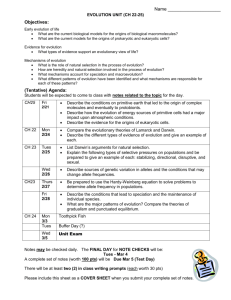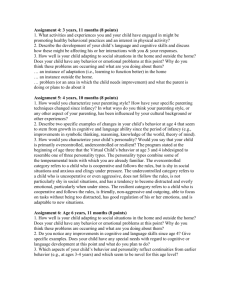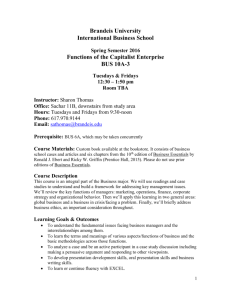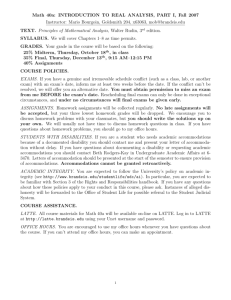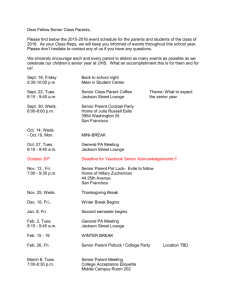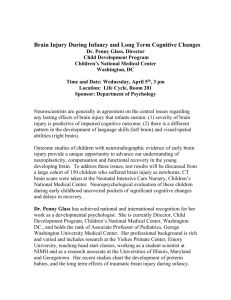Syllabus - Brandeis University
advertisement
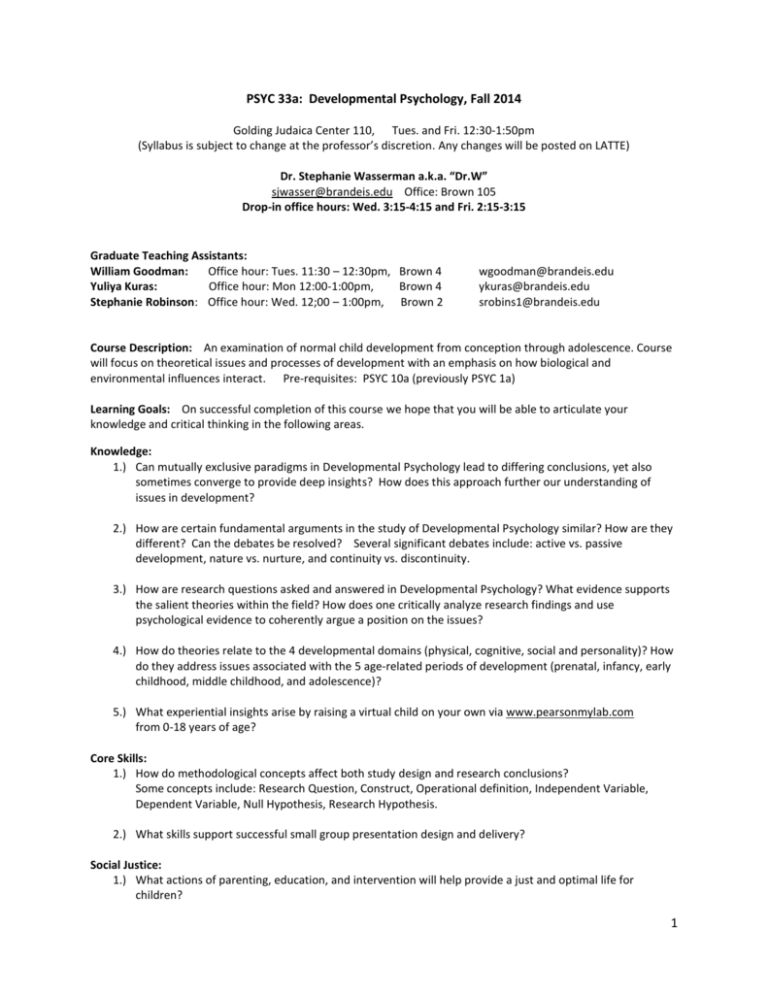
PSYC 33a: Developmental Psychology, Fall 2014 Golding Judaica Center 110, Tues. and Fri. 12:30-1:50pm (Syllabus is subject to change at the professor’s discretion. Any changes will be posted on LATTE) Dr. Stephanie Wasserman a.k.a. “Dr.W” sjwasser@brandeis.edu Office: Brown 105 Drop-in office hours: Wed. 3:15-4:15 and Fri. 2:15-3:15 Graduate Teaching Assistants: William Goodman: Office hour: Tues. 11:30 – 12:30pm, Brown 4 Yuliya Kuras: Office hour: Mon 12:00-1:00pm, Brown 4 Stephanie Robinson: Office hour: Wed. 12;00 – 1:00pm, Brown 2 wgoodman@brandeis.edu ykuras@brandeis.edu srobins1@brandeis.edu Course Description: An examination of normal child development from conception through adolescence. Course will focus on theoretical issues and processes of development with an emphasis on how biological and environmental influences interact. Pre-requisites: PSYC 10a (previously PSYC 1a) Learning Goals: On successful completion of this course we hope that you will be able to articulate your knowledge and critical thinking in the following areas. Knowledge: 1.) Can mutually exclusive paradigms in Developmental Psychology lead to differing conclusions, yet also sometimes converge to provide deep insights? How does this approach further our understanding of issues in development? 2.) How are certain fundamental arguments in the study of Developmental Psychology similar? How are they different? Can the debates be resolved? Several significant debates include: active vs. passive development, nature vs. nurture, and continuity vs. discontinuity. 3.) How are research questions asked and answered in Developmental Psychology? What evidence supports the salient theories within the field? How does one critically analyze research findings and use psychological evidence to coherently argue a position on the issues? 4.) How do theories relate to the 4 developmental domains (physical, cognitive, social and personality)? How do they address issues associated with the 5 age-related periods of development (prenatal, infancy, early childhood, middle childhood, and adolescence)? 5.) What experiential insights arise by raising a virtual child on your own via www.pearsonmylab.com from 0-18 years of age? Core Skills: 1.) How do methodological concepts affect both study design and research conclusions? Some concepts include: Research Question, Construct, Operational definition, Independent Variable, Dependent Variable, Null Hypothesis, Research Hypothesis. 2.) What skills support successful small group presentation design and delivery? Social Justice: 1.) What actions of parenting, education, and intervention will help provide a just and optimal life for children? 1 Teaching Strategies: lecture, class discussions, My Virtual Life computer simulation (ages 0-18) , small group Parenting Forum Presentations, My Psych Lab, short video clips, journal article discussions, and Just -In -TimeTeaching a.k.a. QTs. Required Readings: Boyd,D. and Bee,H. (2015). Lifespan Development (7thed.). Pearson Pub. Specific journal articles will be made available via LATTE. CLASS POLICIES: Timely arrival: Please be in your seats by 12:30pm so that the lecture can begin on time and the instructor is not distracted by the door opening and closing, opening and closing, opening and… Excused absence policy: Attendance is important to your grade and missing classes can make a dent, both in your final grade and your grasp of crucial lecture material important to the exams and essays. Each student, however, is allowed two excused absences. To apply for an excused absence, please e-mail William Goodman at least 2 hours before class begins. A doctor’s note is ideal in cases of illness, but we understand there are some circumstances where it may not be possible. E-mail William Goodman at wgoodman@brandeis.edu Cell phone policy: The use of cell phones in class, for talking, texting or reading/writing email is prohibited. If you wish to leave your cell phone on “silent” mode because of an ongoing emergency situation that you may need to respond to, please speak to me at the start of class to let me know. Laptop policy: Laptop computers in class can be distracting to me and other students, in part because the temptation to take “just a second” to check email or web updates is hard to resist. If you feel that your learning will be hampered by not having access to your laptop for note-taking or other legitimate purposes, please speak to me. Otherwise, keep your laptop turned off and stowed away during class. Ball cap and hat policy: Ball caps and hats are not to be worn during class. I really enjoy getting to know who you are and caps just make it more difficult see you clearly. Late assignment policy: If an assignment is handed in or presented late, the grade will be lowered by 10% (one letter grade) for each calendar day it is late. Please, if you find you are having trouble with some of the class material; come see me as soon as possible. Maybe I can help you focus your thoughts so that you can be fully prepared to do your best! ADA Disability Related Accommodations: Sometimes students are unaware of the wide range of services offered through the Americans with Disabilities Act. If you are a student who needs academic accommodations because of a documented disability, please contact me and present your letter of accommodation as soon as possible. If you have questions about documenting a disability or requesting academic accommodations, you should contact Beth Rodgers-Kay in Academic Services (x6-3470 or brodgers@brandeis.edu.) Letters of accommodation should be presented at the start of the semester to ensure provision of accommodations. Accommodations cannot be granted retroactively. Academic Integrity and Plagiarism policy: You may only submit your own original work in this course; this includes quizzes, exams, and presentation materials. Please, be careful to use APA style when citing each of your sources when you give you’re Parenting Forum Presentations. You are expected to be familiar with and to follow the University’s policies on academic integrity (see http://www.brandeis.edu/studentlife/sdc/ai ). Faculty may refer any suspected instances of alleged dishonesty 2 to the Office of Student Development and Conduct. Instances of academic dishonesty may result in sanctions including but not limited to, failing grades being issued, educational programs, and other consequences. An atmosphere of mutual respect is necessary for the type of collegial interaction that I expect from Brandeis University students. It is rare that students exhibit disrespectful behavior in class. However, if a student is disrespectful to fellow students or their professor, they will immediately receive one verbal warning. Such further behavior will not be tolerated. If the student’s behavior does not improve sufficiently, he/she will be dismissed from the class for that day. Attendance will be marked as an absence for that day. The student will then be welcome to return for the next class session. If a student is expelled twice, the professor reserves the right to dismiss the student from the course entirely. LATTE use: We will regularly post messages on LATTE concerning the course. Please check the site at least a few times a week to catch up on any updates. All supplementary readings will be posted on LATTE for your convenience. Piazza.com Communications: All questions will be handled through the website piazza.com. When anyone asks a question, the entire class will be able to see the answer. You will have the option of asking questions anonymously or privately. To sign up, go to https://piazza.com/brandeis/fall2014/psyc33a/home Before asking a question, please check whether it has already been answered on Piazza. The professor will answer questions only after they have been up on Piazza for 24 hours. Evaluation Methods: Exams EXAM 1: Ch 1, Ch 2, Ch 3, Ch 4, first half of Ch 5 and supplemental readings EXAM 2: Second half Ch 5, Ch 6, Ch 7, and supplemental readings EXAM 3: Ch 8, Ch 9, Ch 10, and supplemental readings 40 pts. 40% of final grade 20 pts. 20 pts. 20pts. At the end of the semester I will drop your lowest exam score. If you miss an exam during the semester the “0” will be dropped as your lowest score. The maximum score for your two highest exams = 40pts. Parenting Forum Presentation 20 pts. 20% of final grade QTs Questions and Thoughts 5 pts. 5% of final grade Class participation (thoughtful comments and questions during class/small group discussions) 5 pts 5% of final grade Short response paper regarding your virtual child 4 pts. 4% of final grade 26 pts. 26% of final grade Final Exam Total 100 pts. 100% of final grade 3 Exams up to 40 pts. Approximately 20 points for each one-hour exam and 26 points for the final exam. Exams: Your best chance for the success you are looking for will result from keeping up with both readings and lectures. The lectures can cover material not duplicated in the readings and crucial to the exams, so attending class is very important. Students do best on these exams if they go beyond accurate-yet-minimalist answers, offering expansive, detailed evidence of knowledge of the lectures and readings, and thoughtful engagement with these. You are responsible for the lecture material, even if it is not covered in the readings. You are responsible for the reading material, even if it is not covered in the lectures. Three major exams will be given throughout the semester. If you miss one of these exams the “0” score will be dropped as your lowest grade. The final Exam will be cumulative, although it will focus on Ch 11, 12, and remaining articles. With this in mind, the Parenting Forum Presentations will provide you with a wonderful review of the major developmental issues from infancy through adolescence. The final exam is scheduled by the university registrar. University regulations do not permit the professor to schedule individual make-up examinations before or after this date. If you have a pressing conflict (such as 3 or more final exams scheduled for the same date), then you can arrange with the Registrar’s Office to take the exam on the final exam conflict resolution date, generally the last day of the final exam period. Class Participation up to 5 points Your comments, insights and questions are what really bring this course to life! Five percent of your grade comes from your thoughtful contributions to class and/or small group discussions. I value your contribution and look forward to many interesting class discussions. QTs “Questions and Thoughts” up to 5 points Over the progress of the semester you will be expected to respond in writing to 4 sets of QTs based on the assigned readings. Students will be asked to give brief, “pithy” responses to either 1.) specific questions about the readings or 2.) more general questions asking what you found especially interesting or confusing about the reading. QTs are intended to help you focus your thinking about the readings. Submit your QT responses via e-mails that you receive from your professor on Google forms. Group 1 students will receive the first set of QTs, followed by Group 2 students who will receive QTs at a later date, and then Group 3 students will receive the third set. After all three groups of students have had the opportunity to respond to a set of QTs, the process will repeat itself so that all three groups of students will have received 4 sets of QTs by the end of the semester. QTs regarding assigned readings for Tuesday’s class, are due Mon. by 8am. QTs regarding assigned readings for Friday’s class, are due Thurs. by 8am. Group 1: Students with last names beginning with A - D Group 2: Students with last names beginning with E - L Group 3: Students with last names beginning with M - Z 4 The TAs and professor will read over your questions and thoughts before class to get a sense of what you are thinking and what topics were important or puzzling. The practice of using QTs (known in the education literature as “Just-in-Time-Teaching”) has been shown to increase student learning significantly. QTs will only form a small portion of your grade (5%) and grading on these will focus on quality of thought and honesty (e.g., in describing what may not be clear to you) rather than on fine points of grammar and spelling. Good grammar and spelling are however, appreciated by those reading the QT responses. The best QT responses are short, direct, and honest! Short response paper regarding your virtual child’s development up to 4 points What events or life experiences had long-lasting effects on your virtual child’s development? How did you minimize the influence of any possible negative effects? This short, two to three-page paper (font = 12) gives you an opportunity to briefly describe 4 meaningful events in your virtual child’s life and explain any long-lasting effects they may have had, or the parenting choice(s) that you made to help to minimize potential negative effects. Please select one event or life experience for each of the four developmental domains: physical, cognitive, social and personality. One or two well written paragraphs for each event or experience will be appropriate for this assignment. A two to three-page paper (font = 12), not including the title page, is an appropriate length for this short writing assignment. Parenting Forum Presentations up to 20 points Group presentations arising from your experiences raising a virtual child! Students will give small group presentations (15 minutes) based on insights gained while raising their virtual children. Students will form groups of four members, to create a well thought out and practiced presentation. Each group will focus on one of the age-related categories listed below. I will allow you to meet during class time on two occasions to prepare for your presentation. Age related categories include: Infancy 0-2yrs., Early Childhood 2-6 yrs., Middle Childhood 6-12 yrs., Adolescence 12-18 yrs. Each team member will focus on just one of the four developmental domains: physical, social, cognitive, or personality. Each member will also identify a highly meaningful experience that his/her virtual child encountered and discuss how it affected the child’s development along their specified domain. In addition, each member will present salient supporting information from a peer reviewed journal article. Each student will select a relevant journal article, print out the article (first 4 pages and the first page of the reference list), read the article and high-light the most meaningful information. Each team member should include his/her name on the first page of the stapled article. Each group must hand in a folder containing high-lighted print outs of all four articles. Be sure to hand this folder in to your TA or professor on the day that you give your presentation. 5 Each member will create a well designed poster summarizing or exemplifying their portion of the presentation. Please keep in mind that the picture(s), diagram(s) and font must be large enough so as to capture the attention of students seated in the back rows of the room. Each group will work together to create a well written, 1 page summary of the group’s most valuable points. These might be important facts, thought provoking ideas, questions or arguments that were uncovered while contemplating the journal articles. All information must be put into your own words, cited and referenced using correct APA style. No direct quotes are permitted in the one page summary. Be sure that each article is represented in the summary Please incorporate some enjoyable creativity in your presentation design and make sure your presentation is well orchestrated so that there is movement, back and forth, from one person to another. Practice your presentation well enough so that each person can make eye-contact with the audience and demonstrate an enthusiasm for the value of the information that is being shared! All students must arrive 5 minutes early to class on the day of their scheduled presentation. Presentations are meant to run 15 minutes in length. Practice timing your presentation. Points will be deducted for surpassing the allotted time limit. Ours is a rather large class of up to 120 students, so we will need to divide into 4 smaller sections of 20-30 students in order to successfully run the Parenting Forum Presentations. The professor will divide students into the 4 smaller sections early in the semester. In each section, there will be1 or 2 Parent Forum Presentations on each of the following age-related categories: Infancy, Early Childhood, Middle Childhood, and Adolescence. Time will also be given for open class discussion and sharing of personal insights regarding development within each age-related category. Please present ONLY information that you find MEANINGFUL AND INTERESTING!!! IF YOU ARE INTERESTED, THEN WE WILL BE TOO! How to cite sources using APA style: All information taken from your readings must be put into your own words and cited using APA style: (Author, year) How to reference your sources using APA style: Book: Author’s last name, first initial. (Year). Title of the Book. Publisher. Article: Author’s last name, first initial. (Year). Title of Article. Title of Journal Article, Volume, pages. 6 Scoring Rubric: Parenting Forum Presentations Scholarship Creativity and Preparation Excellent Each team member shared accurate journal article information regarding their specific topic. Physical Dev Cognitive Dev Social Dev Personality Dev Each team member also related this info. directly to his/her own virtual child. A very real accomplishment! (10pts) Very Good Most of the team members shared accurate journal article information regarding their specific topic. Physical Dev Cognitive Dev Social Dev Personality Dev However, some small mistakes were made. A very interesting presentation! (8pts) Needs improvement There were a few too many mistakes in the journal article info that the team members shared. And / Or material needed to be presented with greater clarity. Physical Dev Cognitive Dev Social Dev Personality Dev Team would have done well to pay more attention to article content. An enjoyable presentation that just needed more polish. (7pts.) All team members shared equal role and choreographed their presentation in creative manner. Each team member also shared a well designed poster with pictures and font large enough to be seen by students in the back row. Some team members played a larger role than others even though they attempted to choreograph their presentation. Most posters were well designed but there could have been improvements in conceptual information, font size, pictures or diagrams. Most of the team members maintained eye-contact and generally resisted reading from note cards. Presentation appeared to be composed more of individual reports rather than a choreographed creative presentation. More attention needed to be given to creating valuable posters. Some of them appeared “rushed” or underdeveloped. Just needed more attention and polish. All team members maintained eyecontact and resisted reading from notes. Wonderful! (4pts) Well done. (2-3pts) Sometimes team members read directly from note cards and/or some members were uncertain “who was to do what.” The information was interesting but the presentation needed more practice. (0-1pts) 7 Excellent Very Good Needs Improvement Handout Team passed out a well written handout explaining valuable journal article information regarding each domain. Sources for each point were cited using APA style and a reference list was included using excellent APA style. (3pts) Team passed out a handout describing some of their valuable journal article information, but either the points were a bit unclear or they did not use proper APA style when citing sources or creating their reference list. (2pts) Team did not pass out a handout regarding their important academic information. (0pts) Folder The team’s folder included each member’s highlighted journal article. Each student placed his/her name on the article they discussed. (3pts) The team’s a folder included most of the members’ highlighted journal articles. Or, one or more of the articles were not peer reviewed journal articles. (2pts) Most of the members did not highlight a peer reviewed journal article. (1pts.) Team did not hand in a folder (0pts) Presentation Score = Grading Template for Presentations 20 points: A + (19.4 - 20pts.), A (18.6 -19.3pts.), A- (18 - 18.5pts.) B+ (17.4 -17.9pts.), B (16.6 -17.3pts), B- ( 16 -16.5pts.), C+ (15.4 -15.9pts.) , C (14.6 -15.3pts.), C- (14 -14.5pts.), D+ (13.4 -13.9pts.) D- (12 -12.4pts.), D (12.6 -13.3pts.), F (0 -11.9pts.) 8 Course Registration Instructions For “My Virtual Life” (0-18 yreas) What You Need to Enroll in Your Professor’s Online Interactive “My Virtual Life” A Course ID: wasserman 74497 A valid email address that you check regularly This address will be used to confirm your registration and for other communication about the course. Your instructor will also use this email address to communicate with you. A student access code (Or, you can pay with a credit card or a PayPal account.) This pre-paid code is printed inside the Student Access Code Card. The code card may be packaged with your new textbook or it may be available for purchase separately from your school’s bookstore. To Register and Sign in to Your Professor’s Course the First Time Go to www.pearsonmylab.com Click Student under Register. Enter your Course ID and click Continue. Choose your enrollment options Read and accept the licensing agreement You have a Pearson account if you have used other Pearson online products. Enter your username and password, and click Next. If you don’t have a Pearson account, click “No” or “Not sure” to search for possible accounts. Complete your account set up by entering your name, email address, a username and password, and any other required information. Complete the registration process. Paying for your course access. If using a credit card or PayPal, you will be prompted to enter your payment information before your registration process is complete. Print the Confirmation & Summary You now have access to your professor’s “My Virtual Life” as well as many additional online supports. Click Go To Your Course, and then in the left panel, click “My Virtual Life” and start your interactive program to raise your very own virtual child. Enjoy! To Sign in to Your Course Again Later Return to www.mydevelopmentlab.com Click Sign In. Select the Student option. Enter your Pearson account username and password and click Sign In. In the left panel, click the course name to continue your work. 9 Fall 2014 Course Schedule PSYC 33a Developmental Psychology (Subject to change at professor’s discretion) Date Fri Aug 29 Tues Sept 2 Fri Sept 5 Topics subject to change Any changes will be found on LATTE Welcome! Readings and homework due before this meeting Basic Concepts and Methods Theories of Development Ch 1 Ch 2 Prenatal Development and Birth Begin raising your virtual child 0-4 years taking notes on child’s milestones re: physical, cognitive, social, and personality dev. Ch 3 p.57-71 Supplemental Readings on LATTE: Glynn, L.M., & Sandman, C.A. (2011) Ch 4 Prenatal origins of neurological development Tues Sept 9 Physical, Sensory, and Perceptual Development in Infancy Fri Sept 12 Physical, Sensory, and Perceptual Development in Infancy continued The other race effect develops in infancy Ch 4 Supplemental Reading on LATTE: Kelly, D.J., Quinn, P.C., Slater, A.M., Lee, K., Ge, L., & Pascalis, O. (2007). First half Ch 5 Tues Sept 16 Cognitive Development in Infancy Fri Sept 19 EXAM 1: Ch 1, 2, 3, 4, first half of Ch 5 and articles Tues Sept 23 No Class: Thursday Schedule “Brandeis Day” Fri Sept 26 No Class Tues Sept 30 Cognitive Development in Infancy Second half Ch 5 Fri Oct 3 Physical, Sensory, and Perceptual Development in Infancy Ch 6 Tues Oct 7 Physical, Sensory, and Perceptual Development in Infancy Ch 6 Fri Oct 10 Physical and Cognitive Development in Early Childhood Ch 7 Tues Oct 14 The Mind in the world: Culture and brain EXAM 2: Second half Ch 5, Ch 6, Ch 7, and articles Continue raising your virtual child 4-18 years taking notes on milestones re: physical, cognitive, social, and personality dev. Supplemental Reading on LATTE: Ambady, N. (2011). 10 Date Topics subject to change Any changes will be found on LATTE Time in class to prepare for Parenting Forum Presentations Readings and homework due before this meeting Hand in short response paper regarding your virtual child Tues Oct 21 Note: Only those having completed raising their virtual child from 0 -18 years will be permitted to participate in the Parenting Forum Presentations Social and Personality Development in Early Childhood Ch 8 Fri Oct 24 Social and Personality Development in Early Childhood Fri Oct 17 Varieties of altruism in children and chimpanzees Tues Oct 28 Physical and Cognitive Development in Middle Childhood Fri Oct 31 Physical and Cognitive Development in Middle Childhood The linking of concrete and symbolic representations. Tues Nov 4 Social and Personality Development in Middle Childhood Gender and group process Fri Nov 7 Relational aggression, gender, and social-psychological adjustment EXAM 3: Ch 8, Ch 9, Ch 10, articles Tues Nov 11 Time in class to prepare for Parenting Forum Presentations Fri Nov 14 Physical and Cognitive Development in Adolescence Gene-environment mechanisms promoting resilience Ch 8 Supplemental Reading on LATTE: Warneken, F., & Tomasello, M. (2009) Ch9 Ch 9 Supplemental Reading on LATTE: Uttal, D.H., O'Doherty, K., Newland, R., Hand, L.L., & DeLoache, J. (2009) Ch 10 Supplemental Reading on LATTE: Maccoby, E.E. (2002) Crick,N. and Grotpeter, J. (1995) Ch 11 Supplemental Reading on LATTE: Kim-Cohen, J., & Gold, A.L. (2009). Tues Nov 18 Parenting Forum Presentations Fri Nov 21 Parenting Forum Presentations Tues Nov 25 Physical and Cognitive Development in Adolescence Fri Nov 28 No Class: Happy Thanksgiving! Tues Dec 2 Physical and Cognitive Development in Adolescence Ch 12 Fri Dec 5 Last day of class Physical and Cognitive Development in Adolescence Ch 12 Supplemental Reading on LATTE: O’Brien, L., Albert, D., Chein, J., & Steinberg, L. (2011). Adolescents prefer more immediate rewards when in the presence of their peers. Ch 11 11 12


